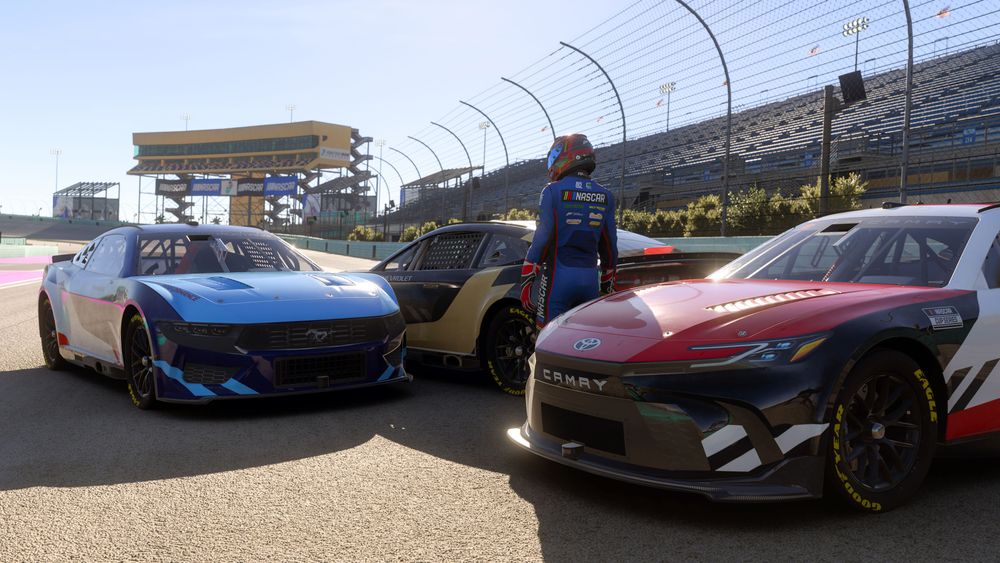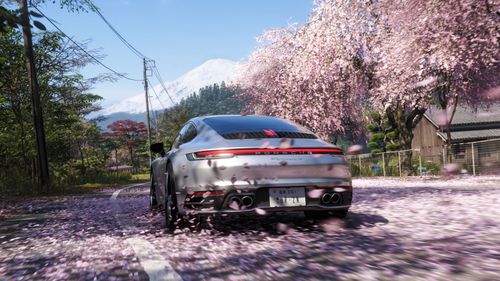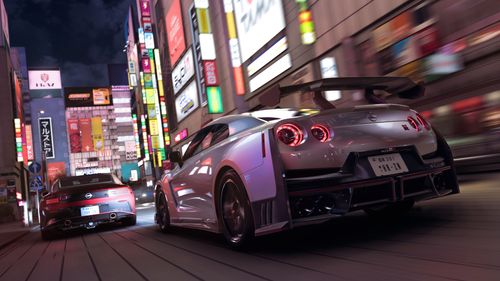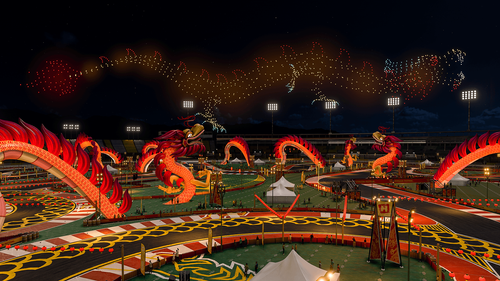The following article is adapted from a presentation and AMA (“ask me anything”) hosted in the Forza Official Discord on November 7, 2024. These remarks, explanations, and responses to audience questions have been edited for length, clarity, and accuracy.
Intro
T10 Platypus (event host): First off, could you tell us a little bit about yourselves, and your history in video games and audio?
Mike: Sure. I mean, Nick and I have known each other for probably 20 years now at this point.
Nick: We first met in 2004.
Mike: My own career in game audio is, I was a contractor on Forza Motorsport (2005), the original, the OG, and then I was hired as a full-time employee for Forza Motorsport 2. And so, I worked full-time for Turn 10 almost to the end of Forza Motorsport 4. Then I left to work for a different division within Microsoft. But I still had a hand in Forza. And then after that, I went to actually go work for Gran Turismo for a little while. And by a little while, I mean like 8 years. And then in a giant full circle moment, I'm back here for my second stint at Turn 10.
Nick: And yeah, I've been in the industry, it's my 25th year this year. My first game was Fur Fighters on the Sega Dreamcast. And my first racing game was Project Gotham Racing, back at the launch of the Xbox. And I was at Bizarre Creations up until 2010 when I joined Turn 10, and I've been here for the last 14 years. I was audio director on Forza Motorsport 4, Forza Motorsport 5, Forza Motorsport 6. And then I moved over to a publishing role where I was more involved with the Forza Horizon games and Forza Street. Then I moved into a more tech focused role. And in March last year, I was asked to come back and take over Forza Motorsport again. So, when I joined Turn 10, it was me and Mike. And now here we are again, 14 years later!
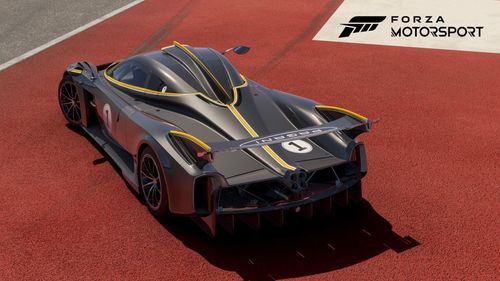
How We Make Car Sounds
Nick: The first thing we need to do is research the car. As soon as the team agrees that we want to put a car in the game, we're going to do some research: looking at the engine specs for that particular model and its drivetrain layout. Is it a front-engine, mid-engine, or rear-engine? What type of exhaust does it have, what type of intake does it have, etc.? And then the biggest question is, do we have this car already in our library of recordings? If we do, then we're good to go and we can skip a few steps. If we don't, our next first step is, is a car recording that we can use available for purchase? There are several companies around the world who sell perfectly acceptable car recordings for our needs. And if we don't need to go record it because they already have, that's a much better solution for us. But, that’s not often always the case.
Our next step is to locate the car. Can the manufacturer provide one? Do they have one in a press fleet, or in a museum somewhere, that we can record? If not, can we find a race team or private owner who has the car? Sometimes with rare cars, it's quite difficult to track down who owns these things. But you know, we have a team of people whose job it is to go out and find this stuff. Once we find the car—is it located somewhere near a drag strip or a private runway that we can use for recording? We record all of our cars driving up and down on a track. A track with a long straight would work too--
Mike: It must be a long dry straight.
Nick: Yeah, a wet straight track, less so.
And then the most important question: are they willing to drive, or let us drive, the car at full throttle through the entire rev range all the way up to the rev limiter at speeds approaching the top speed of the vehicle? The answer is normally no, but we ask really, really nicely, until they hopefully say yes.
Mike: Yeah, we've gotten pretty good at it.
Nick: If we get all of this, then we can arrange to record the car.
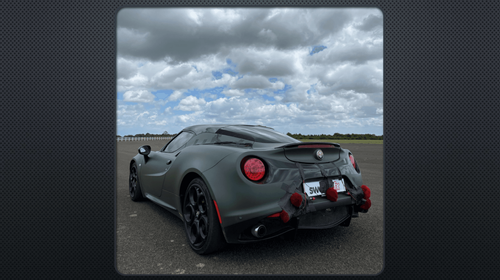
How do we record the car? Here’s a picture of one of the car recordings that we've done. This is actually from one of our external suppliers, but it shows the multiple exhaust microphones that we can attach to a vehicle. In this case, there are 5 mics on that exhaust, but we record 14 channels. There'll be multiple microphones pointing at the engine, the intake, exhaust, forced induction, so turbos and superchargers, hybrid systems, transmission, and a multi-channel microphone in the car, so we can simulate the interior of the car in surround.
Once we get the car mic’d up, we drive it up and down the runway in a single gear. We'll get into first, second, third, fourth. Sometimes we can get to fifth gear, and sometimes we run out of runway, and we can't do fifth (or we all die, and that would be bad) but we go as fast as the runway lets us in a single gear. Then we'll do some driving through the gears and get some simulated driving.
And then also we've got the slow stuff. We've got engine start, idles, blip, shut down, horn, doors opening and closing, hood, trunk, bonnet...
Mike: And anything else that is really interesting about the car!
Nick: Yeah, any cool sounds that it makes, we'll try and get all of those.
Then once we get the recording, we can bring it back to Turn 10. We find the best takes and the best channels within each of the recordings that represent the sound we grabbed. Then we’ve got to clean it up. We're driving it up and down the road, so there's road noise, there's wind noise, and sometimes there are other sounds, rattles and just scrapes and things that shouldn't be there, that we've got to clean up and get out of the recording. Because as the revs go up and down, sometimes there are sounds that don't pitch up and down with revs. And they'd sound weird if suddenly they appeared and disappeared as you were going up and down through the rev range. So, we have to clean it all up.

And then there's the secret sauce. We use a bunch of proprietary tools that take that and convert it into assets that we can use in game. We then need to implement those sounds. So, we've got our game-ready assets. We use FMOD Studio as our audio tech. FMOD is a company we've been working with for a very long time, all the way back to Forza Motorsport 2, and they provide the tools and tech that we use to play back the sounds in the game. We then take all of those samples that we've created, all those assets, and they're then mapped to game physics, so that what you do in the game matches the sound exactly as if it was in real life. So, as you press the throttle, the sound changes, the intake comes up, the exhaust character changes.
Mike: If you tax at 5000 RPM, you're hearing 5000 RPM, that sort of thing.
Nick: Yeah, as you come off the throttle, you'll hear the character change, the intake go away, all the little bubbles and backfires will start playing and stuff. So, we reproduce all of that. And then, since for this version of Forza we've added audible upgrades, we have to do that for all the different audible upgrades. So, we're not building one car. We're building many versions of the same car within the car.
Mike: Yeah, it's a giant matrix of stuff that goes into one car.
Nick: Race cars are cool because you've got a lot of upgrades that we've got to try and get sounds for. And then we test that everything's working correctly and doing all the things we expect it to do.
And then we can take it to our final stage, the final mix. So, if one of us was at the session, we've got our memories of what the car sounded like on the day, we've got the original recording that we can go back and listen to. But we do also look at YouTube and online references and try and get a sense for what people's expectation of the car is going to be.
Then we make sure that we've got everything working in the game, all the camera views sound correctly with the right sounds playing and positioned in the right place, in surround sound and doing that for both player and AI, including replays. Obviously with spectate mode coming in, replay sounds are way more important. So, we spend a lot of time making sure that feels correctly, and that you can hear the car in the distance as it would be if it was really that far away from you at that track.
The second part of that is the environmental audio. So, we have a system whereby the car sounds interact with the world as you're driving through the world, and we have to make sure that all that's working correctly for that specific car.
And then finally, we do a final mix here in our mixing room at Turn 10, which is set up for Dolby Atmos 7.1.4, where we'll validate that everything's working correctly, and the car is done.
And that is how you make a car sound!

Mike: Well—this is also just for the engine. This isn't the tires. This isn't any of the myriad of other things we have happening. This is literally just the engine sound.
Nick: And to be totally transparent, that whole process has some back and forth, because me and Mike sometimes disagree, and it takes about a week. So, a car from start to finish, we can usually do it in about a week. Oh, not the sourcing bit. The sourcing bit can take months, years, decades to find the cars we need.
Mike: Just depends on the rarity of the thing you're trying to find. I mean, we've got a pretty good network at this point, of people who know people. But some cars show up and you're like, dude, I think there's two of these in the world. How are we going to find one of them?
Nick: And they're like, oh, we found one. And they let us take pictures of it. And then we asked that person, can we drive it? And they say no, obviously.
Mike: Or they say “yeah, but we have to hire a whole crew of mechanics.”
Nick: So, there are a lot of factors that go into the sourcing side of it.

Audience Q&A
What is Turn 10 doing to improve the audio design in game with a AAA budget? (asked by kswapash)
Nick: So what we've just explained to you is sort of the process we've been using for 20 years.
Mike: Pretty much.
Nick: The difference is in the nuances. It's that stage where taking the recording, and what you do with the recording before you plug it into the game, and how you plug it into the game and wire it up to stuff, that's the place where it defines how good it is and how authentic it's going to be. You can over-press things at the editing stage. You can end up with poor recordings because you didn't do the job right on the racetrack.
Mike: A lot of racing game companies do these initial steps kind of the same way. And where the artistic approach starts to come into play is really during the implementation and the mixing. Like are you going to go for a more naturalistic approach, or are you going to go for a more Hollywood kind of thing? You know, it's a subjective approach by whoever is kind of in command point, to be honest.
Nick: Like I said, you've been here now, what, 6 months?
Mike: Coming up on six months.
Nick: I've been back on the project for like, 18 months. When I came back on board, a lot of the decisions about the way the car sound was already set, and there's no way we could go back and rebuild 500 cars by that point. But there were things that I wanted to change, and we'd started working towards changing them. And then we hired Mike, and then he came in and he had a bunch of ideas. And we've sort of melded what I wanted and where I want to go, and what Mike wants to do and where he wants to go. And that's what we started rolling out in Update 13.
Mike: It is a new paradigm. We're essentially just now getting off the ground with the new ideas and the new way forward.
Nick: Because we wanted to take our time, and we wanted to get it right. We know the community was not happy with some of the things that we've done. A lot of those things, as I said in my blog post, we agreed with, but we didn't want to rush into it and then not have a plan that we knew was going to be a long-term plan that we could consistently get right moving forward. So, this is where we are today.
Mike: I mean, we're fully aware that we've got a lot of catch up to do.
Nick: With the team we have right now, we can build 10 to 12 cars a month. It’s a fairly consistent thing that we can do with the people that we've got and the ideas that we've got right now. Now, as every release comes in, the number of cars is different for each release. So, if we're shipping 6 new cars, that means we've got 6 cars of bandwidth for potential to go change stuff. If we've got 12 cars in the pack, that could take up all of our time and it won't leave us very much time to do community requests. The community updates don't take as long, so hopefully we can always get something out, but we can't guarantee that every month there will be new community-focused fixes because there may be just too many cars for us to build.
Mike: One of the things we want to make clear to everybody out there is, you know, we are listening. Even if we're not posting on forums and doing that sort of stuff, we're listening.

What is the most challenging thing in making the car sound realistic? Or what is the most difficult part of your work? (asked by Crystal Daddy)
Mike: Some cars are, you know, I've used this analogy before where some cars, especially at stock levels, some cars just aren't great voice actors, if that makes any sense. Some cars, you know, you can take every expensive microphone in the world, and you can make the most pristine recording of a car that just doesn't really sound that great in real life.
So that's always a challenge when you see a car come up on our list. And it's like, we both kind of look at it and wince a little bit because we know that car isn't super compelling at stock levels in real life.
Nick: I think the biggest challenge I've always run into is people who know cars and have been around cars, they know how loud cars are. And people say, “it doesn't shake my bones.” And it's like, yeah, because it's not 120 decibels probably when you're playing the game, unlike the real car, where the volume is so loud it's physically shaking your body.
Mike: Yeah, when you're standing next to a full tilt-race car that's doing its thing. And some of these cars, even at idle, you can feel the air pressure coming off. It's so loud. And that skews your impression of the car, but it's one of those things that it is sort of hard to capture.
Nick: The only way to reproduce that sensation of your body shaking is to have it that loud, so the air pressure is shaking your body. There is no easy way to reproduce that at low volumes. And unfortunately, most people aren't playing the game at real world race car volume.
Mike: There's an analogy that sound guys like to use for this sort of thing when talking about gunshots, because when you fire a gun, you feel the kick of it, there's air pressure, you feel the physical force of this thing. And that skews your impression of what that thing sounds like. And if you go make a general sort of gun recording, the dirty little secret is that if you're recording, you know, a .38 handgun, it doesn't sound like “BOOM,” you know, it sounds like "pew.” And so, the idea is to kind of do what you can to get your impression of that across.
Nick: It's part of what we do—it's not just trying to understand, “I need to make this car sound authentic.” What's authentic? Is it my impression of the car on the day I was there when we recorded it? To me, that's authentic. But then I've got what came down the microphones and onto the recording, which doesn't quite sound the same way it did to me standing next to it, but that's also authentic. And then there's 30 videos on YouTube, none of which sound the same, but they're all of the same car, because it depended on what camera was used, what microphone was used, what setup was used. So, everybody's interpretation of “authentic” is somewhat different. And part of our job is to try and deliver something that we believe delivers an authentic experience, but we may have to enhance some things or tweak some things or make things not quite how people think it is.
It's like, it doesn't sound like this YouTube video, but it does sound like that YouTube video. Did we pick the wrong YouTube video? You know, it's a tough thing to sometimes match expectation, because everybody's expectation could be based on, “well, I saw that car in this Fast and the Furious movie.” So that's what they expect the car to sound like; when in reality, the car they recorded and put in the Fast and the Furious movie might have absolutely nothing to do with that actual car. You know, it's all done in post, and could be something very different. So, expectation versus authenticity is a very difficult thing for us to manage.

How do you choose cars that are going to get new audio? And will all the cars in Forza Motorsport eventually have updated audio? (asked by multiple players)
Nick: I'm going to flip those two things around. Is everything going to get updated audio? I would say unlikely, for two reasons. One, we're probably going to run out of time before we've actually got to update--if every car takes a week and we've got 500 cars to make, and the number of cars is increasing every month...
Mike: Two, we're a pretty small team. And one of the previous questions was like, “hey, what are you going to do with a AAA budget?” We don't have, like, unlimited budget. We only have so much time, we only have so much money. You know, it is a business.
Nick: But we will do as many as we can. And we're prioritizing them based on two criteria. What cars are the community reporting to us? There's a list, we troll that page once a week and add up all of the votes. And we've created a prioritized list. There's also the cars that we want to fix that may be different to your list because we're not happy with them. But there's also the third angle, which is, can we find the car you want us to go fix? Because if one of those cars is a very rare car and we don't have a recording of it, we've done the best we can with the source that we have. It's not right, but it's as close as we can get with what we have. Until I can find a better recording or something that's closer, maybe even not that car, but something very similar to that car, then I'll update it.
One of the reasons the Zonda R took so long was, we didn't have a recording, and we've now found a recording. So that's it. Sometimes it'll be like, yes, this is the number one most requested fixed car. Number two on the list currently is the Mercedes Sauber C9. If anybody knows where we can find one, please, please let us know.
Mike: We'd love to go get it.
Nick: We've both been searching for that car for years and years and years and years, and the only one we're aware of is hanging on a wall at Mercedes with no engine in it.

Why can't the developers just pull the audio off of YouTube and/or why can't you just fly over to _____ continent and just hold a mic up to the exhaust? (asked by multiple players)
Mike: Well, we can't do that with YouTube. A, that's illegal and B, that's illegal.
Nick: But as we explained in the recording, what we need to do is in order to be able to simulate the car correctly in the game, we need recordings of the engine, the intake, the exhaust to transfer all the different bits of the car. And in order to do that properly, we need to drive it up and down the track. So, we need to find the car. We need to find the owner willing to let us do the things we need to do.
Mike: That's the thing. Sometimes even manufacturers are shocked when we say, hey, we need to get reference for this car. And they'll send us, you know, a 60-second recording done through a GoPro of some guy doing donuts in a parking lot: “oh, here you go. Here's your reference for this car. Or here's the sound files for this car. You can make this work, right?” It's like, well, no, no, not really.
Nick: But you know, some manufacturers have been brilliant. Not long ago, Lamborghini gave us the opportunity for some people to go out to Italy, and we got the Lamborghini Sián at the Lamborghini test track, which is the car we've just updated in the game recently. That was the recording that we did at Lamborghini. They provided the car for us. Super rare car, but they managed to get it for us, and we got a really good recording. So that car's just been fixed. Mike, you got to go out to the East Coast to record some NASCAR engines for the recent NASCAR releases.
Mike: Yeah, the current NASCAR engines in the game are sourced from a recording I made a month and a half ago, or yeah, two months ago now.
Nick: So you know, once we found them, it's quite easy for us to get them and put them in the plan and update them or add new things as they come in.
Mike: A lot of people don't realize what a giant time suck just trying to find some of these things can be. Yeah, it can get pretty crazy, especially if you're chasing the rare stuff, it's just never-ending.
Nick: All of the communications happen initially between business people. The licensing folks at Turn 10 will be talking to the marketing team at the car manufacturer. And generally, once the audio people can get to talk to the mechanics over at the manufacturer, we can make it happen really quickly. But it's getting those connections, finding the right person to talk to, to make things move quickly. And as soon as we do, sometimes we can make it happen. But sometimes the manufacturers are like, “no, we, we made five of those and we've sold them all. Sorry.” And then they have to reach out to the people who bought them and see if any of those would be willing to help us. And, you know, a lot of these rare cars end up in car collections and never, unfortunately, ever get driven.
Mike: I mean, Nick and I are both totally down to go get on planes and go record cars wherever they pop up. But it's all a question of timelines, budget and our own bandwidth. There's just a lot that goes into it. I would love to be able to just flip around the world recording cars, but that's just not feasible.

What do you consider to be the primary difficulties in authoring vehicle audio? (asked by PJK)
Mike: There can be a few there. Every once in a while, at a session, you'll get a driver who doesn't really want to put his foot into it. And so sometimes you have to really coax people at the session to kind of push their car a little harder than they're comfortable. You know, if the car redlines at 8000 RPM, but the guy doesn't want us to rev it past 6000 RPM, sometimes that's kind of a challenge. The challenge is also if you're recording in really noisy environments, sometimes in places that are like test cells or engine dynos, where the engine is out of a car, up on a test bench in basically a giant echoey concrete room that's just made for testing engines, not treated for sound at all. So, you'll get a fantastic recording of a really great engine that sounds like it's in a bathroom.
Nick: I didn't call it out on the initial slides, but sometimes the only way we can get access to a car is an engine on an engine dyno, or maybe a car on a chassis dyno. And sometimes it's like, we'll take that over anything. What we want to do is get it out on the track where we can really get the sounds that we want to get. But sometimes it's a case of, there’s Plan B, Plan C, Plan D, there's things we can do to try and capture the sound. But I think the hardest thing is still probably finding the cars and convincing the owners to let us do the things we want to do.
Doesn't help sometimes when, like, I've been at Turn 10, I think a year and a half. And our old boss, Alan Hartman, had an Audi RS4 and he put a supercharger on it and I'm like, “Alan, can you let me record it?” And he went “yes.” And we blew the engine on the dyno! A: never break the boss's car. It doesn't do your review any good that year. And B: yeah, we've broken a few cars over the years.
T10 Platypus: So, people see you coming towards them and they run.
Mike: Yeah, well, early days, early days we definitely like, and I'm pretty sure anybody who's gone out and recorded cars that hasn't done a ton of it, you learn some lessons the hard way early on. I had a fantastic round at Gran Turismo of not ever blowing anything up!
Nick: We haven't broken anything in years and years and years now. But the trick is having somebody who's a mechanic or mechanically minded on-site, because sometimes they'll hear something and go, “that doesn't sound right. Stop.”
Mike: And we have no problem pulling the plug on a session, even if the car's all mic’d up, everything's ready to go, if the mechanic says “don't do this, this thing's going to explode,” forget it, we’re all going home!
Nick: We've probably done enough cars between us now to know when something doesn't sound right. You know, I remember hearing a Ferrari Testarossa running as a flat 11. And that was really not a pleasant sound. Knowing it's just, like, oh, that sounds expensive.
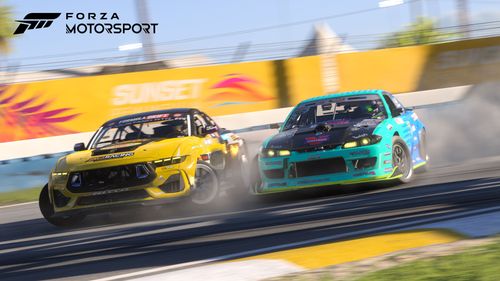
Is it possible to bring over the ray-traced audio from Forza Horizon 5? (asked by multiple players)
Nick: So the term “ray-traced audio” refers to the simulation of the reflection of sound from the real world. We've been doing that since Forza Motorsport 5. We built that system way back then and we've been updating it and augmenting it, every version since FM5. So, we already have that system, and it's actually been through many rounds of revisions.
It works slightly different than in Horizon, because they have to deal with an open world and we've got racing circuits and it's not quite working the same way, but the idea of modelling the sound reflecting off the world around you is something we've been doing for over 10 years.
What is the car audio overhaul plan? Is it going to be all at once, or a few cars updated at a time? What is the estimated time frame before we see this being rolled out? (asked by PerpetualHernia)
Nick: We started rolling it out in Update 13.
Mike: Bits at a time.
Nick: Really bits at a time, as many as we can do each month as soon as they're done. We're not holding anything back--when it's done, it's going live on the next release train, whatever the next release train is. So, I think we've got a few coming in the next release, there’s slightly more than we've done on previous ones. But we look at each release and see how many we've got done and where we're at in the car offering schedule. Obviously, we can't not ship cars that are going live in the next release. So yeah, it will vary every month, but we hope to have something every month, but please don't be disappointed if it's like a car one month it might be 8 cars.
Mike: It is important to us. We're a small team, so we're trying to get to it.
Can you give us any sneak peek about what other cars are getting their sounds fixed? (asked by multiple players)
Nick: We know a lot of you aren't happy with some of our Ferrari V12s, and some of those are coming in the next update. There's a sneak peek.
T10 Platypus: You heard it here first!
Nick: Yes. I'm not going to say which ones.
Mike: Yeah, no, that category has been on the list in general for us.
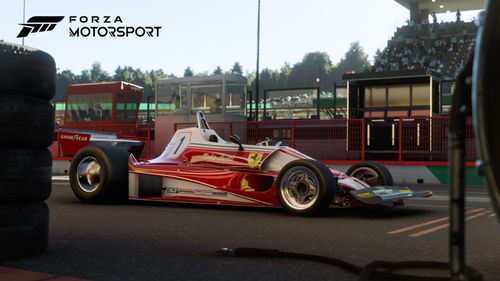
What are the challenges of sourcing an extremely rare car? (asked by multiple players)
Nick: Yeah, all we can do is try and find a real one. And if we can't find a real one, use all the available reference to us, and find something that mechanically and sonically is very close to it. Same cylinder count, same displacement, same type of exhaust system.
Mike: At that point, if you can't find the real thing, then the only other option you have is just to try to go for the next best thing, which is a sound-alike essentially.
Nick: And in many cases, we are doing that. I was hoping to put a video in my deck, but unfortunately, I can't take a video from an iPhone and put it in the PowerPoint without a bunch of conversions, which I didn't get a chance to do. But we have recording teams around the world we work with, as well as doing some of our own. And sometimes they'll just send me a video, say, oh we found this car today, and it's sitting in a parking lot revving. But we at least get a chance to hear what it sounds like and go, oh, that sounds cool. And then sometimes it's like, oh, this sounds like that thing, let me go cross reference. So sometimes we get some weird hits where something we weren't expecting will come along that sounds the way we want it to sound.
Mike: We have weird casting calls out throughout the globe for certain types of stuff. And every once in a while, we'll get a hit on something and we'll get a little reference video. We'll listen to it and go, oh, yeah, that might be the thing. Or maybe we need to keep looking.
Nick: I don't think he'll mind me saying this, but one of our main sourcing avenues is a guy who runs one of the biggest car and coffee events, meetups in California. So, he knows everybody in Southern California who's got cool cars. So, we're always reaching out to him saying, hey, what turned up this month? Anything new and cool? We also work with quite a few movie folks, like recording teams who do sound for movies. And obviously they're trying to find cars for movies all the time. And then sometimes that will lead us down a path to a car that we weren't expecting to get.
Mike: We're partners with car groups up here in the Pacific Northwest, you know, exotic car dealerships, you know, private car collectors. It's just kind of an ad hoc network of people who know people.
Nick: Our library is shared with Playground Games. So, we have a shared library of every car they've ever got, and every car we've ever got.
Mike: Their game tech is different than ours. So, while we share the same source, from that point forward, Playground kind of does it one way, and we do it another, just because of the differences that we have. But yeah, we do share a lot of the same source.

Is there anything else you would want to share about maybe why you don't share more sounds with Playground Games? (asked by Decent777)
Nick: We went down different paths for a while. We’re a simulation game. They were doing open world stuff. The underlying recordings are the same, but the tech that builds the cars is slightly different to better suit the needs of that. We are working to try and converge them back together. There's a lot of work currently going on right now. One of us may have been in the UK recently talking to Playground about this very thing. So short term, they're quite different, but longer term, the plan is that at some point in the future, we'll be able to have both games using the same tech, same sound module, same recordings, just tweaked slightly to better suit the two different natures of the games that we'd make.
Would we ever see a sound tuning menu for the exhaust tones like we've seen in other racing games? (asked by Reggie)
Mike: I mean, we've all considered it. It would be a fair bit of work to get going. It's something that, you know, we're fans of. But in terms of the feasibility of it, honestly, I just don't know.
Nick: Yeah, bringing back audible upgrades was something the community wanted for a long time. It sort of gives you some of that. You can change your exhaust and it changes the way the car sounds. But trying to build something that actually works and sounds good across a car list as big as ours?
Mike: That's the thing for us, the scope of our game is so big.
Nick: That's a massive, massive challenge to try and make it so that it's not a case of, there are 20 different things that you can tweak and 18 of them all make it sound terrible. That's not something I really want to chip, so I would rather focus on making the car sound right and authentic, than giving access to some weird synthetic thing that models the exhaust in weird ways.
What's something people might not know about sound recording that you would want to share? (asked by multiple players)
Mike: People don't realize that even on a stock Honda Civic, people don't really realize just how loud some of these cars are in real life. Like if you completely take the muffler off of a stock Honda Civic, it's incredibly loud, like vision-blurringly loud. It's hard to get a sense unless you've been to an event, if you've ever been to, like, an NHRA event where there's fully uncorked dragsters going around. Like the actual sound pressure level of stuff is sometimes really, really eye-opening to people. And it's another one of the challenges for recording cars that are like that, where you have to find microphones and recorders and anything that's in your recording chain that can handle those kinds of sound pressure. Because you'll blow stuff up.
Nick: We've discovered over the years that, from the sound coming out of the exhaust, it can be too loud for the microphone, it can be too loud for the input of the recorder, it can be too loud for the game setting on the recorder itself. There's so many places where it can be too loud. And we've gone out and bought really expensive high volume-handling microphones, and then we've got to buy these 20 DB pads that turn the signal down by 20 DB before it hits the recorder because it's just too loud. There's just so much noise coming through. So that can be really challenging.
I think one of the other things for me has always been, when you drive a car in real life, a huge amount of what you perceive is the feel: G force. G force is pulling you around in the car physically shaking underneath you. You don't get any of that with a controller, and most of the time you don't even get that with a play seat and a steering wheel. You get a bit of it through the wheel, but you don't get the G forces. So like, part of our job is, how can we make it feel like it is? Because I've been lucky enough to go out on some race tracks with race drivers, and the first time you go into a corner at full speed. You instantly think you're going to die.
Mike: It's terrifying.
Nick: It's one of the most terrifying things ever. And just the fact that suddenly you're like, hit the brakes and you're thrown forward, and just the physical violence of it all, it's just, there's no way you can brake that light and make this corner at that speed, but they do, and they do it all the time. But trying to reproduce that sensation is a combination of visual effects and audio effects and how we do things. So, it's really hard for us to sometimes try and reproduce just that sense of danger.
Mike: Violence and danger, yeah. I mean, even if you're in just a go-kart, even if you're in a 100-horsepower car, racing is still dangerous. So, you want to try and convey that. It shouldn't feel like a completely sanitary safe experience.

So out of all the cars in the game, which ones have your favorite sounds or what was the most fun to record? (asked by multiple players)
Mike: I had a chance to do, a little bit ago, the Corvette C7.R, the big fire-breathing race car. That one sounds pretty good. What's actually, I'm curious to ask you Nick, what's your favorite car you've ever recorded?
Nick: I know what mine is, and unfortunately it’s not in the game anymore. The TVR Cerbera Speed 12.
Mike: Really? I know that recording!
Nick: I was lucky enough to be taken out on a track in one of those. We didn't actually get a recording that day because the shaking and the violence I was talking about, the portable recorder that I was using fell apart, because I was physically just shaking so much in my seat, it wouldn't actually record. But being taken out in that thing, and the sound it made, was just almost like a life-changing experience. It was the first time I'd been out in a proper race car. This is over 20 years ago, and I was young then and I was terrified then, so I dread to think how I'd be now, going out in it. But that thing was a monster and just sounded so glorious. It was louder at idle than the car I recorded the previous day at full throttle. It was just so loud. It was unbelievable.
Mike: And I can guarantee you, one of the favorite things I’ve recorded and just ever been around in general, if you're around a vintage late 50s, early 60s Ferrari, you know, 250 GTO, they just sound so good. Like, you can literally play that sound for anyone. I don't care who you are, anyone who hears that sound goes, “ooh, what's that? How do I get some of that in my life?”
Nick: It's very, very musical. You know, it's weird because car manufacturers these days spend millions of dollars making cars sound the way they do, carefully tuning the shape of the exhaust and the width of the exhaust. And back then it was just like, no, just stick this shallow bit of steel on the top of the engine, so the fumes come out the back.
Mike: Yeah, they just sort of went for it, and then it ended up sounding killer.
Nick: They just sound amazing. There is something about those vintage cars. I think for new stuff, the Porsche Carrera GT is pretty special sounding.
Mike: That's an interesting one.
Nick: Because it's got that weird upper octave overtone. I could no doubt talk about why cars sound the way they do all day, but maybe that's a different talk.
Do you have any AI assistance to record, or is that something you've considered? (asked by YoYoGavri)
Mike: Ooh, that's all people in the car on the grounds.
Nick: Every time we've tried to look at utilizing AI, there's always enough artifacts that you can tell it's AI, but it's improving. It's a rate that, maybe someday? I've always wanted to try and use AI to take a recording of, say, a stock Honda and have a recording of a fully straight pipe Honda, and see if it can make me one in the middle.
Mike: I like the idea of being able to, if it's AI, being able to show it a reference, like, we were talking about the Sauber C9, if I had a really good piece of reference footage for that and I could say, hey AI, analyze this and then output a bunch of sound files for me that I could use. I mean, wouldn't that be lovely?
Nick: But we're not there yet. But maybe someday. Never say never.
If you place a boom mic against a popping exhaust, how could the microphone not get blown? (asked by n9mysKID)
Mike: Oh, you put it out of the way. You don't put it directly in the exhaust path. And yeah, ask me how many microphone cables I burnt up by having them straight in the exhaust pad, accidentally right behind or draped over an exhaust pipe. That's maybe the other thing that people don't understand--how hot exhaust pipes get.
T10 Platypus: Do they melt, like, what happens?
Mike: Oh yeah, with the heat coming out of it.
Nick: There is a video on YouTube of me recording a Koenigsegg at a dyno shop down the street using all of Mike's microphones from the other job that he had, where it kicked out this 2-foot flame out the back, and melted all the mics in the cables. All of Mike's cables, not mine.
Mike: I actually have a scar on my leg from doing hot laps in a Shelby Cobra, where the side pipes are right under the door, and when you get out of the car, if your leg touches the pipe, guess what happens? They're literally glowing red. And the driver, as I was getting out of the car, the driver goes, “hey, now, be careful once you get out!” But by that point, I was screaming and clutching my leg.
Nick: The microphones that we use are all rated for super high volumes. Some of the little ones that we've used these days were actually developed for F1 on TV. They're the tiny lapel mics that you normally set on people, but they can actually install them inside an F1 body.
Mike: And they take an enormous amount of sound.
Nick: Because being 2 inches away from an F1 engine is not something I'd ever want to be, from a hearing perspective.
Will you add chassis flex down to the game? (asked by amadjan)
Nick: It's sort of already there, but it's a system that we need to improve. Yeah, it's simulated in some way now. But yes, there are things that we're thinking about to try and make it better.

T10 Platypus: Is there anything else that you want people to know about audio and Forza Motorsport?
Mike: For folks in the community: we're listening. That's one of the big takeaways.
Nick: Thank you for your feedback. We are taking it on board. Hopefully you're seeing the improvements. I see an awful lot of comparison videos on YouTube. Yes, we watch all the stuff on YouTube. We know what people are saying. We're both super passionate about racing games. We've made an awful lot of racing games between us, and the things that you want are mostly the things that we want. And we're trying to get there as best as we can.

